- Home
- Jen Calonita
Mirror, Mirror Page 7
Mirror, Mirror Read online
Page 7
Snow stepped up to the huntsman and looked him squarely in the eye. “I won’t let her do this.”
Then, into the tree line and fog she darted, hiding from view.
Every ghastly tree looked the same: decrepit, stripped of bark and black as a raven’s feathers, not a single leaf left
on its branches. The trees in this forest were indeed all dead. Their trunks were thick and knotted. Their branches scrolled and twisted over and under one another, up and down the tree trunks, littering the path with vines that one could easily trip over, or get caught in. Snow blinked hard, trying to walk steadily over them, fearing she’d fall and never be able to get up again. No one would come looking for her. If they did, it would only be to finish the huntsman’s job. She kept walking, feeling the air grow colder and the fog thicken like pea soup, till soon she could barely see in front of her hand. A crow cried. Or maybe it was a raven, there to watch her die. How foolish she had been, humming and singing and thinking of Henri and the flowers she would bring back to the castle, never realizing this rare outing was really an excuse to lead her to her death. Where was she going, anyway? Every turn she took looked the same. Was she traveling in circles?
She stopped when she heard a sound. It wasn’t a bird. The wind seemed to have disappeared now that she was so deep in the forest, but there was a distinct howling sound. She looked up into the fog and could barely see through the tightly wound dead branches to view the sky. She listened harder and wondered, worriedly, if she was hearing spirits. Ghosts of the lost souls like her who were doomed to wander this forest forever.
Get ahold of yourself, Snow. There are no spirits.
The only thing haunting you is your own past.
The path was dark and growing darker the deeper she went into the woods, and she didn’t like the look of some of the trees. Some were rotted out, with hollowed-out holes in their stumps that looked like eyes. She had the unnerving feeling they were staring at her, which was silly, really, but she was already worked up. When she stumbled by a tree with large holes that looked like piercing eyes and a mouth that appeared to be screaming, she stepped back to get away. But the ground behind her was unsteady, and she felt herself begin to fall into a cavernous hole. Crying out, Snow descended into the darkness, splashing down into a murky pond. Quickly, she picked herself up and tried to tread out. That’s when she saw two things in the water slithering toward her. Were they logs? Or were they crocodiles? She tried to move faster to get away, but her skirt was now heavy with water and holding her back. When she finally reached the edge and pulled herself out, she still felt trapped. Where was she? A cave?
Snow pushed her wet hair out of her eyes and looked around, her vision soon adjusting to the low light. Was that an opening up ahead? She could see a parting of trees in the distance. Maybe it was a way out! She rushed into the clearing, feeling like she could breathe again as the world opened up once more around her. As she ran, her shoe caught on something and she tumbled forward, landing hard on her knees, her hands sinking into the dirt. She looked back and saw the long tree root her foot was caught on. She tried to yank it free and heard a tear. Her skirt was caught on a branch thickly wound along the ground. It was as if the tree wanted to hold her prisoner in this forest forever.
Maybe she should just let it.
The anger she had felt only hours ago at her aunt, the huntsman, and her father and mother for not seeing the Evil Queen for who she really was had given way to self-pity. It was obvious that she was completely alone in this world. And that she had been naive enough to trust the most terrible of foes. All there was left to do was cry.
Snow lifted her head. There was that whispering sound again. It sounded like the rustling of leaves—if there had been any leaves on the trees or dried up on the ground. But the branches and dirt were bare. It felt like the wind was following her. Could her mind be playing tricks on her? She closed her eyes for a moment and listened.
I will catch you! she heard her mother shout. She could almost see her younger self running past her mother in the gardens by the aviary. I’ve got you! I’ll always catch you! her mother would say.
If the queen catches you in here again, Princess, she’ll sentence you to do the dishes right alongside me! she heard another voice ring out.
No one was there, but Snow knew the voice. It was Mrs. Kindred, the cook who had survived her aunt’s dismissals over the years. When Snow’s mother was alive, she’d encouraged her daughter to be friendly with those who helped them in the castle, and Mrs. Kindred had always been Snow’s favorite person to chat with. She could see herself sitting on a chair, no more than six or seven, watching Mrs. Kindred chop onions, carrots, and leeks and throw them all into a giant pot of broth. She and Mrs. Kindred only stole a few moments together most days now—she suspected her aunt must have forbidden the cook from talking to her, what with how Mrs. Kindred always quickly sent Snow on her way—but back then she had always peppered the cook with questions. (“How do you cut the carrots so small? Why do leeks have sand in them? What spices are you going to add? How do you know how much to put in?”) On one such occasion, she’d been such a distraction that Mrs. Kindred had finally picked her up, holding her high on her broad chest, and let her stir the pot herself. Eventually, she taught her how to dice and chop, too, since Snow wouldn’t stop talking. By suppertime, young Snow had convinced herself she’d made the whole meal. She had been so proud, too, carrying the dishes out to the dining table that night. She walked so slow that she hadn’t paid attention to the fact that everyone at the table was arguing till later. It had been her parents and her aunt, actually. She’d thought they’d be so happy—all of her memories with them tended to be good ones, but this time she saw the memory differently.
No one had noticed her at first. Her parents were sitting next to each other and Aunt Ingrid was across from them. Normally they would been fawning over the soup, but this time they were too angry to see she had entered the room. She’d never heard Aunt Ingrid raise her voice to her father before, but they were definitely not seeing eye to eye about something. As her mother’s lady-in-waiting, Ingrid always walked a few steps behind the king and queen, waited for directions, and only spoke when spoken to whenever they were in public. Sure, Snow had seen them be more informal when they were in private quarters, but there was always some sort of impenetrable wall between her father and aunt. Why would her mother have asked Aunt Ingrid to be her lady-in-waiting if they had disliked one another, though? She had never understood how her father had fallen in love with a woman like Aunt Ingrid. The memory of that night just reinforced her feeling that something had not been right between them. Aunt Ingrid and her father had definitely been angry with one another. She just wished she knew why.
Images of her mother with her aunt flashed by. Her mother getting dressed in a navy blue gown with crystal stitching before some celebration. Her aunt combing her mother’s hair for what felt like hours as they talked about the queen’s appointments and duties. Was it all a ruse on her aunt’s part? Had she secretly been plotting Queen Katherine’s death from the moment she set foot in the castle? Or was it before that? But they were sisters! Snow did not have a sibling, but she could not imagine ever harboring such hatred for one.
Snow heard more whispering. Was it spirits or her imagination? She struggled to sit up, but both her skirt and foot were still caught in the thorny branches.
You think you’re so clever, don’t you?
It was her father’s voice now playing tricks on her. She could picture him sitting in the throne room, awaiting visitors, and she could remember laughing with her mother. They were constantly playing little tricks on him. Snow remembered calling him the wrong name on purpose. She would call him Fritz, and he called her Ediline—her mother was Frieda. Then they’d all pretend to be mad at one another for using the wrong names. Once Snow had even convinced two visiting dignitaries to call her father Fritz over and over. Then she and her mother had jumped out from the shadows to
let him in on the joke.
“Only you, young Ediline, could make me laugh like this,” he’d tell her. “You are the light of my life.”
“Of both of our lives,” Mother had said.
Aunt Ingrid had taken away all of that.
Snow lifted her hands to her face and wept again. For her parents, for herself, and for the life together Aunt Ingrid had stolen from them. Instead of challenging her aunt about her father’s whereabouts or the closing of the castle gates, she’d looked away. She’d allowed her aunt to dismiss most of the staff and had never questioned why her aunt would disappear into her own private chambers for days. Why had she allowed her aunt to stop trading with other kingdoms? To make such hard demands on their people and tax them so heavily? Why had she let them all live in fear? Unlike her parents, she had just let the kingdom die on the vine, much like these haunted woods.
As far as princesses went, she was a pretty pitiful one.
Tears fell down her cheeks, running off her chin and settling on her hands, which still covered her face.
Are you going to give up?
Snow wiped her tears and sat up. “Mother?”
It was her mother’s voice, clear as day, but she wasn’t really there. It was just another memory. Another moment meant to tear her heart in two.
Are you going to give up? Mother had said. But when? And to whom?
She lay there and tried hard to recall where these words came from. Finally, she remembered. She’d been sitting in the royal carriage. She remembered the feel of her mother’s hand tightly wrapped around her own small one. The carriage had given a sudden lurch and then stopped. There had been shouting, guards jumping off the carriage and people running. Her mother had sat up and looked out the window.
“No!” she had shouted. “Unhand her!” She looked back at her daughter. “Stay here, Snow.”
Snow was too curious. She had climbed out of the carriage and hurried behind her mother. The guards were standing over an old woman, shouting. Her mother quickly stopped them and knelt down by the woman. She didn’t appear injured, but she looked sad. Her clothes were equally so—haggard and patched up, much like Snow’s own were these days. Lying beside her was an empty basket. A rotten apple lay in the mud beside it.
“I will have the guards escort you home. Where do you live?” her mother asked.
“I have no home, my queen,” the woman said. “The earth is my dwelling, and all I need comes from it.”
“Your Majesty, we must be on our way,” a guard interrupted.
Her mother hadn’t moved. “Not until I am done speaking with this woman,” she commanded in a strong voice. She turned back to the beggar. “The world is a beautiful home, but I would feel better if we gave you some warm clothes to wear and perhaps something to eat.” Her mother hurried back to the carriage and grabbed the picnic basket that always accompanied them on small trips. Snow knew it was full of food, and they rarely ate all of it. “Take this.” She untied the cloak around her neck. “And this, too. It will keep you warm on your journey.” Snow had watched in wonder as her mother reached out and embraced the woman. “I wish you well, my dear.”
“God bless you, my queen,” the beggar had said, and then Snow and her mother returned to the carriage. They both waved as they drove by the woman.
“Small acts of kindness are so important,” she remembered her mother telling her as they had pulled away. “I once stood in the same spot she is now. I came from nothing.”
“I don’t know what I’d do if I had nothing,” Snow recalled saying.
Her mother had lifted Snow’s chin and looked her straight in the eye. “If that day ever comes, are you going to give up? No. You will carry on just as I did. I didn’t give up, and someone took a chance on me.” She straightened and leveled her gaze on young Snow. “Always remember your past, Snow, and let it help you make decisions on how to rule your future. But never, ever give up.”
The memory startled her. She knew her mother had always been generous and kind, but she had long forgotten this memory. And it had been so important.
Suddenly, the air felt cold and she heard another voice.
Your tears won’t change your fate!
It was Aunt Ingrid. She had said those words to Snow the day after her father had left—been banished, killed, who knew?—when Snow had refused to come out of her room to have supper with her. Her aunt had sent for her twice, and Snow still wouldn’t come. She was too distraught. Instead of taking pity on the child, Aunt Ingrid had been outraged. She had flown into Snow’s room and unleashed her full wrath.
How different her aunt was from her mother. And that’s when it dawned on her: This was who ruled their kingdom? A woman whose cruel words and actions spread like venom? Wasn’t Snow the rightful leader in her father’s absence? She was of age. Her father’s rule had begun when he was only sixteen, a year younger than she was now. Her mother never forgot where she came from. Was Snow going to? Would she just lie there in the grass and give up on herself? On her kingdom?
Or would she take the knowledge her parents had given her and change her future?
Are you going to give up? No. You will carry on just as I did.
Snow set her jaw, and this time she used all her strength to pull her foot loose from those vines. She twisted, she pulled, and finally she broke free from its grasp. Then she stood up, letting the new dress she had marveled at only that morning tear at one of the seams. It was just a dress. She’d get another. With a deep breath, she began walking again.
However long it took, she would wander through this darkness till it led to the light.
Twenty-three years earlier
“Concentrate,” her master commanded.
Ingrid did as she was told and closed her eyes, blocking out the sounds of the world. She could feel her breath rise and fall in her chest. She waited till she could feel the tips of her fingers and even the weight of her toes before she imagined what she wanted to happen.
Light, light! she said in her mind, and when she opened her eyes there was, indeed, a flame atop the wick of the candle where moments before there had been none.
“Good!” her master appraised. They were standing in the middle of his shop, working before the doors opened for the day. Before the shop opened, after it closed, and on Sundays when everyone was home, he taught her all he knew about magic and spell work. She drank it in like a delicious elixir. Never had she been given the freedom to learn like this before. Her father had just wanted her to keep house and stay out of his way. All the farmer cared about was his crops. But her master was there to feed her soul.
Katherine had been devastated when Ingrid announced at dinner that she would be leaving the farmstead to work in the village. She didn’t say where and the farmer had not asked. She told them that it was a good opportunity for her, one that would lead to her eventually leaving home completely. This seemed to please the farmer, who had never warmed to her the way he had Katherine.
In exchange for allowing her to keep boarding with Katherine, she told the farmer she’d give him half her wages. She hated parting with the money she earned, but her new master had no place for her to stay, and she was not about to sleep on the shop floor. It was torturous leaving the life and energy of the village every night and heading back to that sad little farm, but there was one bright spot: her sister was there. And so, she continued making the journey back and forth every day, dreaming of the moment when she could open her own shop and have the power to leave the farmer completely. She’d take Katherine with her, of course. She could never leave her sister.
“Concentrate on the flame,” her master instructed. “See if you can burn it brighter. Bigger!”
Ingrid concentrated, focusing on the flame, envisioning her goal. The flame began to swirl like a cyclone and spiral up till it almost reached the rafters. Ingrid and her master watched in awe, Ingrid wondering if the flame would burn the building down, but then her master commanded the flame to extinguish and they w
ere left in almost total darkness again.
“I think that’s enough for today,” her master said, sounding a bit shaky.
“But we’ve just started!” Ingrid protested.
“And you always want to rush things!” he snapped, hurrying to put away all the books Ingrid had opened. They were filled with spells she wanted to try—love potions, creams to turn one’s skin milky white, even spells that could make a person beautiful. She craved those sorts of things more and more lately. Her face had become windburned from all the travel, and her hands were splintered and nicked from all her work in the shop—just like her sister’s callused hands, though without the apple stains. And yet, more and more men began to notice Katherine, while Ingrid began to feel more and more like an old hag. The farmer never received suitors that had come calling on her. They only came for Katherine.
Well, she didn’t need the farmer’s help. She didn’t need anyone’s. She just needed a good spell.
“There will be more time to work after the chores are done and the customers leave,” her master said, thrusting a crate of small vials at her to clean and fill with elixirs. “Don’t be impatient.” He hobbled to the front of the shop and unlocked the door.
That was his constant critique of her: she had no patience. And it was true.
She wanted to know everything she could about magic, everything he knew, and she wanted to know now.
The bell at the front of the shop rang and a woman with wiry graying hair walked into the shop. Their first customer of the day. Ingrid sighed and started to clean the vials. Once the customers came, looking for beet juice and ragweed, she would have little time to do anything but assist them and keep the place presentable. She quickly put on a brew that was meant to rejuvenate the spirit. The last time she had made it, the entire batch had sold out within the day.

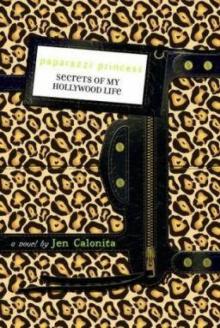 Paparazzi Princess
Paparazzi Princess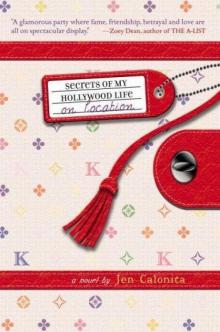 On Location
On Location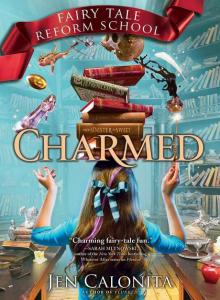 Charmed
Charmed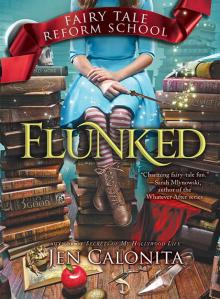 Flunked
Flunked Summer State of Mind
Summer State of Mind Belles
Belles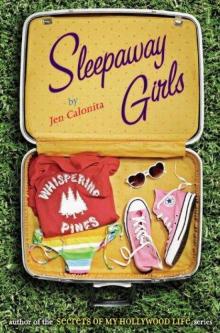 Sleepaway Girls
Sleepaway Girls Broadway Lights
Broadway Lights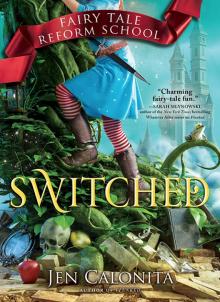 Switched
Switched Turn It Up!
Turn It Up!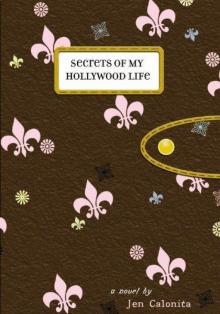 Secrets of My Hollywood Life
Secrets of My Hollywood Life Reality Check
Reality Check The Retake
The Retake VIP: I'm With the Band
VIP: I'm With the Band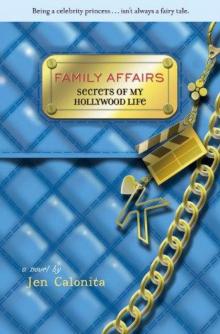 Family Affairs
Family Affairs Winter White
Winter White Side Effects
Side Effects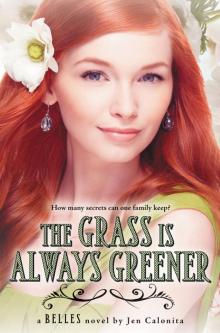 The Grass Is Always Greener
The Grass Is Always Greener Frozen: Conceal, Don't Feel
Frozen: Conceal, Don't Feel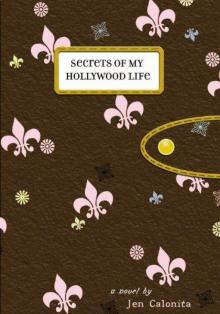 Secrets of My Hollywood Life #1: Secrets of My Hollywood Life
Secrets of My Hollywood Life #1: Secrets of My Hollywood Life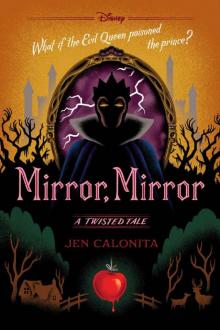 Mirror, Mirror
Mirror, Mirror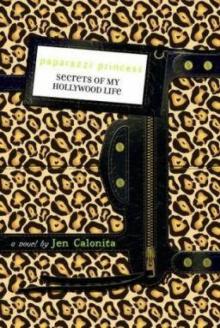 Secrets of My Hollywood Life #4: Paparazzi Princess
Secrets of My Hollywood Life #4: Paparazzi Princess I'm With the Band
I'm With the Band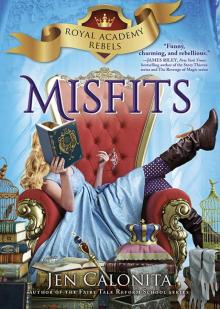 Misfits
Misfits Secrets of My Hollywood Life #5: Broadway Lights
Secrets of My Hollywood Life #5: Broadway Lights The Real Z
The Real Z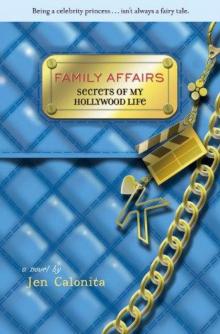 Secrets of My Hollywood Life #3: Family Affairs
Secrets of My Hollywood Life #3: Family Affairs Battle of the Bands
Battle of the Bands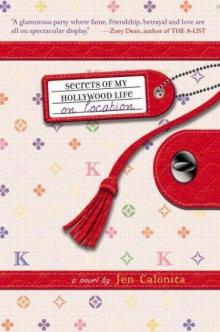 Secrets of My Hollywood Life #2: On Location
Secrets of My Hollywood Life #2: On Location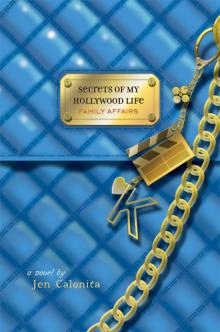 Secrets of My Hollywood Life: Family Affairs
Secrets of My Hollywood Life: Family Affairs Secrets of My Hollywood Life: There’s No Place Like Home
Secrets of My Hollywood Life: There’s No Place Like Home